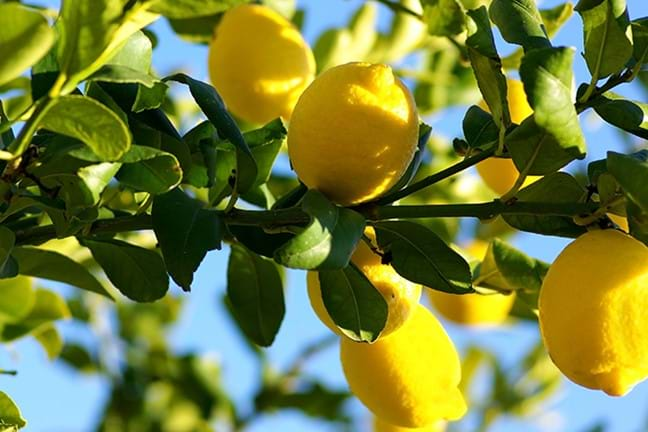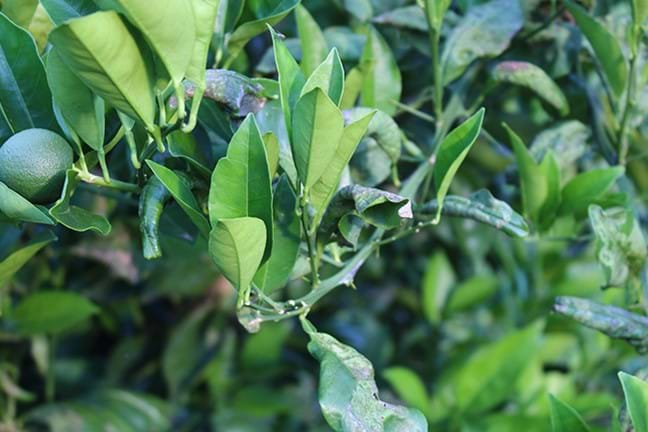Lisbon lemons (Citrus limon 'Lisbon') are thought to have originated in Portugal and are large cold and heat hardy trees that produce heavy winter and spring crops. The thin skinned, juicy fruit are highly acidic and Lisbon is one of the most common varieties grown in Australia.

Being a sizeable tree (growing up to 8 m tall and 4 m wide) Lisbon is a great citrus for a large backyard. For smaller gardens, look out for dwarf grafted Lisbons which reach a more manageable 3 m and can be grown in a medium to large pot on a sunny balcony or deck.
Growing Tips
- When planting a new Lisbon lemon out in the garden, choose a spot with well drained soil that receives at least 6 hours of sunshine a day and enrich the soil in the planting hole first with some Yates Dynamic Lifter Soil Improver & Plant Fertiliser. It promotes increased soil organic matter content and water holding capacity, in addition to providing the new tree with gentle slow release organic nutrients as it establishes.
- For potted citrus, choose a pot with good drainage holes and fill with a good quality potting mix like Yates Premium Potting Mix. Keep new citrus trees well watered as they settle into their new home.
- For established citrus, it's important to keep deep watering and feeding during late summer, as autumn and winter fruit are continuing to develop. Moisture and nutrient stress can adversely affect the quantity and quality of the harvest so it's well worth devoting extra care to your citrus at this time of year.
- Feeding is as simple as diluting 2 capfuls of Yates Thrive Citrus Liquid Plant Food into a 9 L watering can and applying over the root zone each week.
- Sweet sugary sap that's flowing through citrus plants is a magnet for sap sucking pests like scale. Scale insects can be brown, white, pink, brown or grey and appear as small raised bumps along leaves and stems.
Sometimes the scale are hard to spot themselves, however if you see sooty mould developing on the leaves (a black ash like film) or ants moving up and down the stems then they're indicators of a sap sucking insect pest like scale. - Regular sprays of Yates Nature's Way Citrus & Ornamental Spray, on both the upper and lower leaf surfaces, will help keep scale under control. It's based on natural pyrethrin and vegetable oil and is certified for use in organic gardening so is ideal for gardeners wanting to use organic methods of insect pest control.
Citrus deficiency guide
This month we're looking at two more micronutrient deficiencies that can occur in citrus – zinc and manganese. Symptoms of these two deficiencies can be quite similar.
Zinc (Zn) – a main symptom of zinc deficiency is smaller leaves, often clustered together, on shorter stems. Leaves can also be mottled, with pale areas appearing in between the veins. Zinc plays an important role in plant growth hormones and stem elongation which is why zinc deficient plants can be stunted.
Manganese (Mn) – manganese plays a role in processes like photosynthesis. A manganese deficiency shows up as paler leaves with darker veins, usually in younger leaves. Leaves stay their full size, compared to reduced leaf size in zinc deficiency.
Yates Citrus Cure Zinc and Manganese Chelate is a combination fast acting liquid that helps corrects both zinc and manganese deficiency.
Applied as a foliar spray it delivers micronutrients directly to the deficient leaves for faster results.
It's also important to keep feeding citrus during February with a complete fertiliser such as Yates Thrive Citrus Liquid Plant Food. It's been specially formulated with the right amounts of nitrogen, phosphorus and potassium to encourage good leaf growth, strong root development and lots of quality citrus fruit.
Dilute 2 capfuls of Yates Thrive Citrus Liquid Plant Food into a 9 L watering can and apply over the root zone each week.
Ensure the soil around citrus trees remains moist during February as drought stress can lead to trees dropping their fruit or reduced fruit quality. Regular deep watering and a layer of mulch applied around the root zone can help keep the soil moist.

Citrus pest protection
Distorted and curled citrus leaves is one of the most common citrus queries. There are two main pests that cause these symptoms – citrus leaf miner and aphids. Unfortunately once the leaves are twisted the damage is permanent, until the leaves naturally fall from the tree. So, prevention is the key!
Citrus leaf miner is a small moth that lays its eggs on tender new foliage. These eggs hatch into larvae that tunnel into the leaves, creating silvery trails and causing the leaves to distort. It ruins the look of a tree and in severe cases affects plant health by reducing the potential for photosynthesis (capturing energy from the sun).
Citrus trees can start their autumn foliage flush in late summer, growing lots of lovely lush new leaves. New growth needs to be protected from citrus leaf miner attack by spraying the leaves with Yates Nature's Way Citrus & Ornamental Spray. It deters the citrus leaf miner moth from laying her eggs on the foliage, thus preventing the damage caused by the tunnelling larvae. To protect citrus from leaf miner, spray leaves every 5-14 days from when the new foliage is around 4 cm long.
Yates Nature's Way Citrus & Ornamental Spray will also control aphids, which are attracted to tender new citrus leaves. Aphids are small sap sucking insects that can be green, brown or black and can cause leaves to curl under and twist. Like citrus leaf miner, the damage on new leaves caused by aphids is permanent. It's easy to control aphids on citrus by spraying the foliage with Yates Nature's Way Citrus & Ornamental Spray, including on the undersides of leaves where aphids often hide, every 5 – 14 days.
Yates Nature's Way Citrus & Ornamental Spray is based on natural pyrethrin and vegetable oil, is boosted with seaweed to promote plant growth and is certified for use in organic gardening, so is ideal for gardeners wanting to use effective and organic methods of insect pest control.




